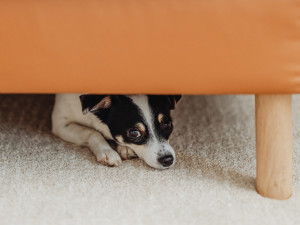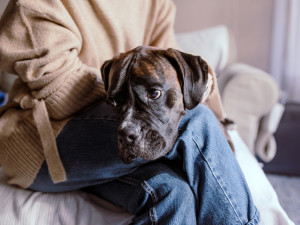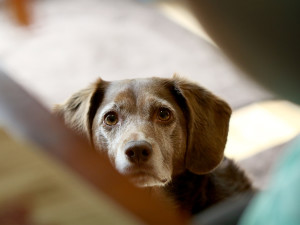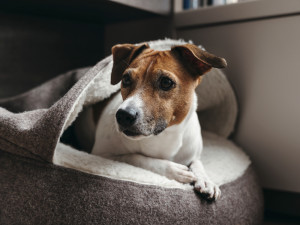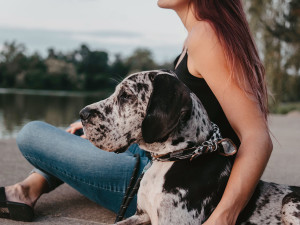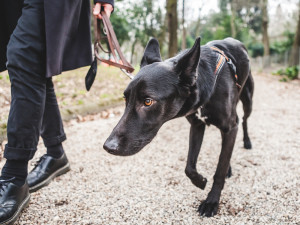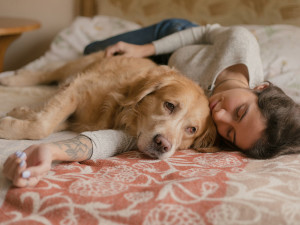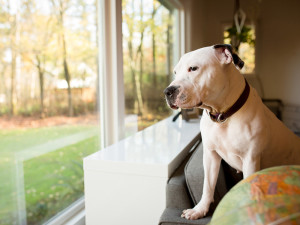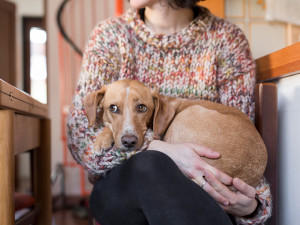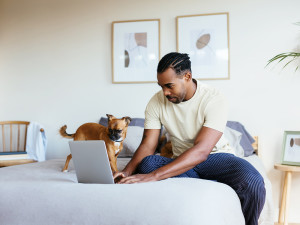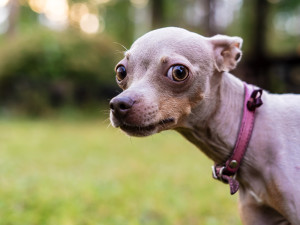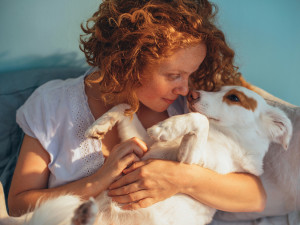Why Are Dogs Scared of Fireworks?
How to keep your dog mentally and physically safe this New Year’s Eve.
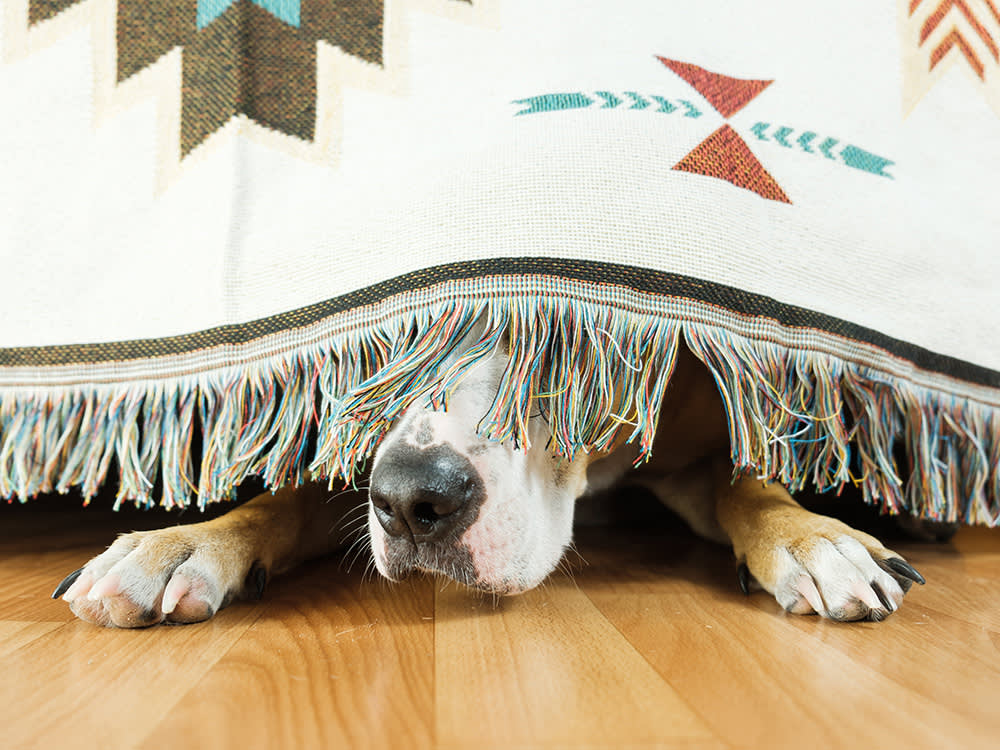
share article

Your pet wants you to read our newsletter. (Then give them a treat.)
New Year’s Eve can be a blast — literally — for kids (and adults who never aged out of blowing things up for fun) as you say goodbye to the past 12 months and usher in 12 new ones. But for our four-legged family members, any holiday that involves fireworks brings a lot more stress than it does entertainment. If you’re a pet parent, you likely know how loud noises like fireworks can ruin your dog’s day. Maybe they curl up in a corner and shake or look for a safe spot in the house to hide. Fireworks aren’t just a source of anxiety for many dogs — they can also lead to burns and health issues if you’re not careful.
The Wildest talked to Dr. Gabrielle Fadl, veterinarian and director of primary care at Bond Vetopens in a new tab in New York City about the dangers of fireworks to dogs and how to keep your pup safe this holiday.
Why are dogs scared of fireworks?
The short answer: Loud noises can be frighteningopens in a new tab to many dogs and cats. The booming blasts of fireworks are unpredictable and sudden and are likely louder than most noises your pet hears on a daily basis. If you have a dog who’s terrified of thunderstorms, they will likely feel the same way about fireworks.
“Similar to thunderstorms, fireworks causing loud, unpredictable noises can be interpreted as a threat to dogs, causing them to hide, show signs of anxietyopens in a new tab (panting, trembling, pacing, whining), or run,” Dr. Fadl says.
With their bright lights and loud noises, fireworks can also create sensory overloadopens in a new tab in animals, resulting in a panicked fight-or-flight response. Although there is no real threat, your pet doesn’t know that and may experience an adrenaline rush that results in rising blood pressure and a faster heart rate. This sense of danger causes some pets to attempt to escape or even react with aggression toward other animals and humans in the home.
How are fireworks dangerous to dogs?
Fireworks come with many risks for dogs, so it’s best to keep your pets safely inside during any New Year’s Eve celebrations. In addition to a sense of fear and stress, dogs who are outside unattended during firework displays run the risk of becoming burned, injured, or even ingesting lit or used fireworks.
Fear & Anxiety
“If dogs are not properly restrained, dogs can get loose and run away in an attempt to find safety,” Dr. Fadl says. “As a result, dogs can get lost or injured while attempting to climb or dig to escape these sounds.”
Burns
Even if your dog isn’t stressed about the noise of fireworks, allowing them outside while you’re lighting sparklers can be dangerous. Dogs may not realize the danger of lit fireworks and get too close, which can result in burns to the face or even the inside of the mouth if they attempt to ingest a lit firework.
“The same precautions that you would take when using fireworks around young children should also be taken with your pets,” Dr. Fadl says. “That means making sure fireworks are not being set off with pets nearby and able to get near hazardous sparks, flames, or strong smoke or odors.”
Health issues related to ingesting fireworks
Fireworks don’t even have to be lit to cause injury to your pet. When roaming the yard after a firework display, dogs may ingest debris or pieces of used fireworks, which contain dangerous chemicals, such as heavy metals, sulfur, and coloring agents. Eating fireworks can cause serious health issues for dogs, such as gastrointestinal distressopens in a new tab or even muscle and nerve dysfunction, which can result in permanent damage.
Fortunately, you don’t need to worry about cats ingesting fireworks because they tend to be more discriminating eaters and likely won’t attempt to eat a used firework. But you should always clean up all used fireworks and debris in your yard before allowing your pets outside again.
Tips for keeping your dog calm and safe during fireworks displays
If you know that your dog is scared of loud noises, make sure to have a plan for soothing your pet during New Year’s Eve celebrations and know how to calm a dog during fireworks. Start by keeping your dog away from any nearby firework displays and safely cozied up in the house. If you live in a cold climate, your pet should be safely inside anyway, but make sure you have them in a place in the house where they feel safe when they hear loud noises.
Make sure your pet has proper identification.
Well before New Year’s Even comes around, your pet should be microchipped opens in a new taband have an ID tag on their collar featuring your current contact information. No one expects their dog to run away, but fireworks can make your pet’s behavior unpredictable so it’s best to take as many precautions as possible. Ensuring your dog has proper identification can improve the chances that they will be returned to you if they do become lost.
Create a safe and calming space for your dog.
One of the best ways to calm your dog during fireworks is to make a space in your home for them to feel safe and comfortable. Choose a space with no windows, like the inside of a large closet or a bathroom, and create a cozy cave where your dog can hide from the noise and lights of the fireworks. You can even use a crate if your dog already feels safe there. Give your pup some of their favorite toys and treats so they feel at home and (hopefully) more relaxed.
“If you can, try to engage your dog in a playful or fun activity, such as a training or play session, before the noises are expected to begin,” Dr. Fadl suggests. “Using positive reinforcement, like rewarding calm behaviors with treats or affection, can be helpful in a sound-phobic dog.”
Try playing white noise.
Soft, soothing noises can be an antidote to the loud bangs of fireworks. Try leaving a some kind of white noise — like the TV or radio — on to help cover the sounds of any firework displays and give your dog something else to focus on. You can even find soothing white- noise playlists, including some specifically designed for dogs, on YouTube and Spotify.
Comfort your dog.
Leaving your pet alone during fireworks can sometimes make them even more stressed. If you can, stay home with your dog to help them feel safer and comfort them if they show signs of stress or fear. Pet your pup with long, slow strokes along the length of their body and avoid any behaviors that seem frantic. Try to keep your voice and your movements calm and reassuring to show your dog that they’re safe with you.
Talk to your veterinarian.
If your pet’s anxiety is especially severe and none of the above solutions seem to help, talk to your veterinarian about other treatment options. Your dog may benefit from anti-anxiety medication, which your vet can prescribe, and you may also want to ask about over-the-counter options, like dog-calming treats, anxiety vests like Thundershirtsopens in a new tab, or CBD products. Never, ever give your dog over-the-counter medication opens in a new tabwithout consulting a vet, and always be sure the CBD products opens in a new tabyou use are completely free of THC and approved for pets.
“Some dogs are so severely impacted by noises that anxiolytic or sedating medication may be needed to help keep them calm and prevent them from harming themselves,” Dr. Fadl says. “There are many safe options, as well as FDA-approved medication for dogs with noise aversion. Speak to your veterinarian as soon as possible about which medication may be best for your dog.”
Clean up all used fireworks and debris.
Even after the fireworks show is over, you still need to keep your dog safe from the possibility of poisoning. Make sure to clean up all used fireworks and any debris in your yard, whether you shot the fireworks or not, before you let your dog outside again.
Keep your dog safe this New Year’s Eve (and every day).
Fireworks may be awe-inspiring and fun for you, but they can be incredibly stressful and even dangerous to your dog. Take precautions to help your pup feel safe this New Year’s Eve and have a plan to ensure that your dog avoids the hazards of fireworks and remains happy and healthy.
References:
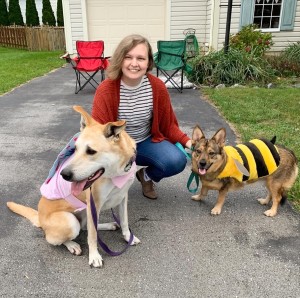
Savannah Admire
Savannah Admire is a writer, editor, and pet parent to two dogs and a cat. When she’s not writing, you can find her reading, playing Animal Crossing, or being an obnoxious nerd about her favorite movies and TV shows. She lives in Maryland, where she constantly debates whether or not to get a third dog.
Related articles
- opens in a new tab
Does Your Dog Need Anti-Anxiety Meds?
How to cope with dog anxiety—from training to medication.
![Muscular white pit bull stands on couch, looking out window to sunny fall day.]() opens in a new tab
opens in a new tabSeparation Anxiety in Dogs
Does your dog freak out when you head for the door? Here’s some advice.
![shy dog frightened in the arms of the owner. this brown mixed-breed hound puppy has a sweet gaze. the female owner has a wool sweater]() opens in a new tab
opens in a new tabWhy is My Dog Shaking? Causes and Treatment
A vet explains why the weather isn’t always to blame.
![African American man with braids sitting on his bed using his computer with his dog next to him also looking at the computer]() opens in a new tab
opens in a new tabThere’s a High-Tech Training Solution For Your Dog’s Separation Anxiety
Like most things in 2023, there’s a Zoom link for this.
![Russian Toy Terrier with ears back]() opens in a new tab
opens in a new tab9 Reasons Why Dogs Put Their Ears Back
Here’s how your dog’s ears can clue you in to how they’re feeling.
![A woman holding her dog close.]() opens in a new tab
opens in a new tabFYI, Your Dog Can’t Stand When You Do These 7 Things
Thanks, they hate it.
